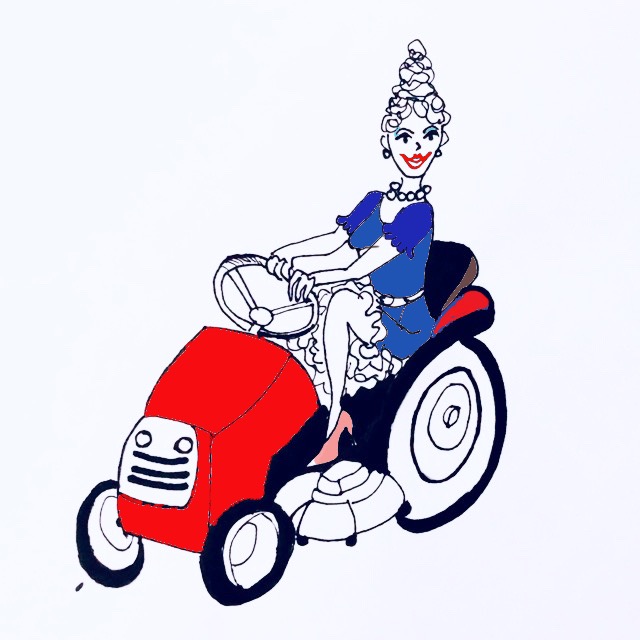Last week at our place in the country, I heard the telltale sound of yard work – that deafening, obnoxious roar – and looked out the kitchen window to see my husband Billy speed by, wielding two black control handles and leaving a long swath of clean cut grass in his wake. He was on the riding lawnmower. I wanted to laugh out loud, he looked so funny on this machine, which is a La-Z-Boy sized chair set atop sharp, whirring blades that revolve 3000 times per minute, shredding everything in their path. Fire engine red with a cushioned vinyl seat, the mower exists as its own first row seat to the violence that it wreaks, a strange but definite seat of power – one for ‘Merica.
I wanted it. I had already learned how to drive the tractor and push a regular lawnmower. With each of these, I loved the tension I felt from being the type of woman I was raised to be – a lady (always sit with your legs crossed, do not chew gum, no cursing) – and the empowerment I got from learning skills that the two generations of women before me had never imagined. My comfort zone is the domestic realm, namely the kitchen because I love to cook, but every now and then I need to break out of there. Plus, I wanted to clear my running path. Some areas were so overgrown, I couldn’t see where I was stepping. The coastal grass grows green and heavy and this is where the cottonmouth snakes rest, hidden from view, until I almost step on them.
‘Can you teach me how to ride the mower?’ I asked Billy.
‘Are you feeling ok?’ But he was more than happy to share. ‘Here’s the choke, here’s the brake, and with this slider, you control the power. Have fun!’
I mounted the throne, hoping I could remember all these steps. My brain only retains directions if I’m doing them all the time, so every year I have to relearn certain tasks, like how to fry a turkey or backwash the pool. After four failed attempts to start, I had to call Billy back over. He turned down the choke, starting it instantly. I grabbed the two black levers and the lawnmower surged forward and, from that moment on, I burned with urgency to get the job done.
Most of the house chores I do – unloading the dishwasher, sweeping the floors, cooking the meals and doing the laundry – are short-lived accomplishments that must be repeated every day. It’s a mini, domestic version of the Greek myth of Sisyphus. When Zeus banished Sisyphus to Hades, his eternal punishment was to push a boulder up a hill only to watch it roll down so that he had to push it up again.
Mowing is also a Sisyphean task: the grass may look fresh and maintained for a few weeks, but then it grows and, soon enough, it’s time to start all over again. This idea plagued me as I rode the mower around the lake. Work can be necessary and yet, at the same time, futile. If it’s futile, it’s hard to get motivated to do the work, and yet, maybe the answer – the real motivation – is the work itself. It’s not like it costs anything to get the job done, except my time. I couldn’t even enhance my experience of this job, as I like to do with house cleaning, by listening to a podcast or a book. I had imagined I’d be able to hear poetry being read on my headphones, but every word was obscured by the machine’s tumultuous commotion. I just had to sit on my everywoman throne and consider where to steer the mower, when to go back and do a double lane, and when to lower and raise the blades.
I stuck to the middle and edges of the road and, as I was mowing, I realized how many fire ant beds there were, one after the other, piled up in the grassy areas. As I drove over them, I heard the unsettling sound of the mower chopping the tops off, making them into small sad cones, like miniature strip-mined mountains. During my second pass, I saw the busy regiments of ants furiously moving around, trying to repair the chaos. The wind was blowing and, depending on the way I was going, it blasted infinitesimal bits of dust and grass, and possibly even dislocated ants, all over my running tights and sweatshirt and face and eyes. Meanwhile, my phone kept slipping between my legs, but I didn’t want to stop to reposition it because what if I couldn’t start the mower again?
I sat up straight on the edge of my seat so I could work the controls from the correct angle. The last thing I wanted to do was plow the mower into the lake, a frighteningly easy prospect. All it took was one false move and I’d be riding onto the rocky shoreline – not so good for the blades. All the while I contemplated the special kind of killer power produced by this machine, with its sharp blades thrashing around beneath me.
Since we’d been in the country, I’d been closely observing the butterflies, caterpillars, bugs and wildflowers. Now I was plowing them over. I wondered if nature might take its revenge: fire ant bites, lurking snakes, or swarms of killer bees. Long ago, as a newlywed, when I first learned how to work a push mower, I had been surprised by the amount of effort it required. The labor I put into the job seemed equal to the process. Yet the ease of this riding lawnmower and the total lack of effort required seemed like a surfeit of power, an egregious imbalance between man and nature. Sorry, ants, I thought, and sorry, snakes, but still I rode along on my power machine, queen of the land.
*
In the afternoon, my daughters and I went running down the long clean lane of cut grass. My rapacious trail was also our clear pathway through the wilderness, the violence, my concession to maintaining civilization. Otherwise, the deep lush green of the coastal grass might seduce me into a lazy oblivion and I’d make excuses not to run because I couldn’t see the snakes.
My mind gets trapped by contradictions, such as modern day living amidst the emergency of the environment, and the violence of the lawnmower versus its convenience and ease. My purist self imagines that life is supposed to just be one way, although it rarely is. Life is both/and. In my job as a writer, I’m always trying to negotiate the line between simply being, in a present and conscious way, one that inspires art and thinking, and falling back into a state of torpor. If I’m truly in the moment at every moment, maybe it’s not eternal punishment after all, if the rock falls back down the hill and I have to do it all over again. Maybe this is life.
After the run, I sat on the couch in a trance, hot and tired, sipping my ice water. I’m not sure how long it will take for the grass to grow, but eventually I’ll have to do this all over again so I can continue yet another Sisyphean task – exercise. The ants will probably just have finished righting their mounds when I come back around on the mower to chop the tops back off again. Their work may seem futile to me, but it’s of the utmost urgency to them, just as my tasks – restoring order in my family’s world – are to me. All the grains of dirt they’ve carried, all the sweeps of my broom, these are the pockets of in-between spaces, when we’re doing what we need to get done. We live here, in these transitional spaces, the building and the growing. I guess I have the snakes in the grass to thank for that – and the riding lawnmower, too.

Wendy Weil Atwell is a writer based in San Antonio, Texas. Her work has appeared, or will be coming soon in Gulf Stream Lit Mag, Glasstire and The Paragon Press. More of her writing can be found at www.quesoconfessions.com
